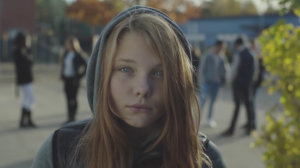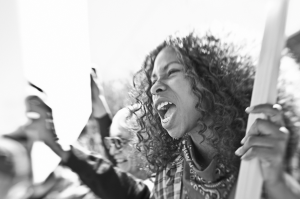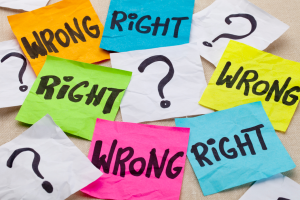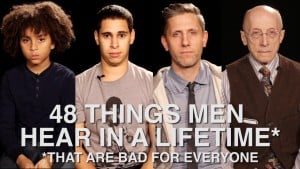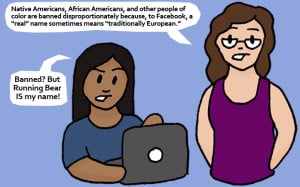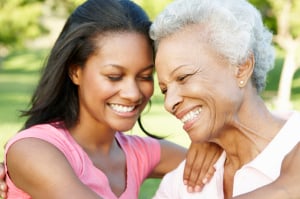
Source: Gallery Hip
Originally published on Adios Barbie and cross-posted here with their permission.
I grew up continents away from my grandparents — they lived in Russia and Israel, and I lived in Chicago. Yes, I got to visit them every few years or so, but I never had an understanding of what life was like for them. I knew on a superficial level some of the struggles they had to go through, but my curiosity stopped me there.
Most of my influential interactions growing up were with either classmates my age or people my parents’ age. I only occasionally interacted with people past the age of 70, and when I did, the conversations were short.
The struggles of older adults were foreign to me.
Most of what I saw in the media suggested that older individuals were all the same—lonely, dependent, and suffering. Little did I know that these depictions, amongst many others, run rampant throughout the media and are part of the problem of ageism. Millions of viewers, like me, had internalized them.
According to the Assisted Living Federation of America (ALFA):
“Ageism is a form of discrimination and prejudice particularly experienced by seniors. Most seniors are mentally and physically active regardless of age with a great deal to contribute. However, societal norms marginalize seniors, treat them with disrespect, make them feel unwelcome, and otherwise generalize as if they were all the same.”
As a long-time fan of Everybody Loves Raymond, I was happy to read the statement by Doris Roberts, the Emmy-award winning actress in her seventies: “My peers and I are portrayed as dependent, helpless, unproductive, and demanding rather than deserving. In reality, the majority of seniors are self-sufficient, middle-class consumers with more assets than most young people, and the time and talent to offer society.”
Even academics agree that media portrayals of old people are narrow. For example, anthropologist Mary Catherine Bateson says that older women must “struggle against a society that thinks that what we do when we get old is watch TV or go on cruises.”
Taking their words to heart, I realize just how many older people I have unjustly categorized. Unfortunately, this is the reality amongst those my age, and I haven’t been alone in stereotyping older people.
But since I noticed my behavior, it didn’t come as a surprise when I read that according to the Images of Aging in America 2004 report by AARP:
“Many misconceptions about aging and older people are more common among those who have not yet reached middle age. That is, Americans under age 35 are more likely than middle-aged and older Americans to think that the majority of older people are lonely, miserable, senile, or suffering from defective memory, ‘pretty much alike,’ and less effective in the workplace.”
When I moved to New York City this past year to study Narrative Medicine and complete my Masters, my appreciation for fighting ageism got kicked up a notch.
I rented a room in Catherine’s apartment. My housemate, like a true New Yorker, was always on the move — she rode her bike across town, was an active member in her religious community, savored fine-dining experiences, relished walks through the park, and frequented fitness classes.
She was an articulate feminist and social justice activist who broadened my own thinking. I’ll never forget the day she returned from a fitness class and told me that she got so fed up with the instructor calling a class full of women “you guys” that she finally yelled out during class, “WE’RE NOT GUYS!”
And in one month, she will celebrate her 80th birthday.
Other than occasional renters like myself, my housemate lived alone, like almost half of older women aged 75+. Even with the daily demands that never ended—the bills, the cooking, the cleaning, and the erratic weather like the brutal summer heat and horrendous winter — she trudged through.
I remember one particular day, before rushing off to my class, I caught her in a chaotic moment trying to fix the WiFi. She had just gotten off the phone with the Internet company and was scrambling looking for something. She was in an overall state of extreme stress.
When she looked up and we connected eyes, I told her, “I want you to know that I see you. And I think you’re a fighter.”
Before I knew it, we were hugging. As we pulled apart, there were tears in her eyes, and just audibly enough, she said, “Thank you.”
Living with Catherine, I became more aware of some of the struggles that older people go through. This past winter, which many readers can probably attest to, was particularly harsh. Outside of my high school and college chemistry classes, I had never given too much thought to the salt put on the sidewalks during the winter.
But living with my housemate, I often thought about the lack of salt on the sidewalks that forced her to stay inside because she was too scared of slipping and falling. “At my age,” she said, “I can’t take that risk.” Sometimes, I was the only human interaction she’d have for days at a time.
Within my daily routine, I noticed the ways older members of my neighborhood were (mis)treated. One time, at the farmer’s market, a vendor had just helped me check out and then automatically changed his voice to speak unusually loudly and slowly to an older customer behind me.
The confused customer asked why the vendor was speaking to him that way. “So you can understand better,” the vendor replied without thinking. “I understand just fine,” the customer said, then turned away and left.
I believe the vendor had good intentions, but this instance points to the larger issue of ageism.
From social psychology, we know that age is one of the first things our brains notice about other people. As soon as he saw the older customer, the vendor had already made a snapshot, and before their interaction even started the vendor assumed how the customer wanted to be spoken to.
If I had randomly seen my housemate on the street a few years ago, I would have categorized her as an “old lady” who was probably “needy.” I would have been no better than the vendor.
Now, I’m not saying that older adults don’t suffer from hearing loss, memory loss, physical impairments, loneliness, etc. I witnessed the occasional memory slip-ups when my housemate would forget things she’d said to me, and I witnessed her other health concerns.
I firmly believe that changes in our physical and mental health are a part of aging and are simply the realities of the body’s organic responses to getting older. All of us will be affected by those changes inevitably.
But the key is understanding that they lie on a spectrum. When we think “all old people” with mental changes are “fragile” or “all old people” with physical impairments are “dependent,” we are stereotyping them. Just because impairments of aging are inevitable doesn’t make discrimination against older individuals excusable.
In other words, discrimination surrounding the aging process and ageism are worthy of attention — just like issues of race, sexual orientation, and gender.
I learned a lot from my time living with my housemate. But before you go looking to room with someone 75+, know that for me living with her was anything but perfect. In fact, it was extremely difficult most of the time.
She came off as hostile and passive-aggressive. At the beginning, I tried to let those things slide because of her age and situation. Indeed, we’re more apt to write it off as “older people can’t control what they say,” or “they’re just not themselves anymore.” That’s sort of how I felt.
But at a certain point, I realized that if she were any other person my age acting that way, I would have said something immediately. It leads me to think that society’s unwillingness to treat older individuals as people in control of their actions is another form of ageism.
For the remainder of my time living with my housemate, I saw her as a nuanced person, not a martyred old woman. She was someone who was tough to live with sometimes, but I still appreciated her accomplishments and the way she expanded my thinking.
As a young adult, it was easy not to think about issues of aging. Why should I worry about memory loss, hearing loss, loneliness, or death when I’m only 23? Overall, it’s definitely not what’s being taught by our society.
So how can we change that and make conversations of aging a norm? Bateson encourages us to learn from different generations: “Be engaged, be productive, and be concerned for other people’s issues.” We need to understand our interdependence, even if we live in places where “independence is an obsession.”
Kick-starting multigenerational conversations is the first step to increase awareness and cultivate meaningful, inclusive conversations. Forget the anti-aging creams or the false idea that the realities of aging only concern “old people.” Why should campaigning politicians catering to the “senior vote” or pharmaceutical ads be the only ones addressing older populations?
Aging happens to all of us and affects our loved ones. We should all be discussing what’s at stake, regardless of our age now.
Activism across multiple generations is the key to well-rounded and meaningful progress. Younger generations offer new perspectives, eager energy, and fluency in new technologies. But older individuals, as Bateson says, bring “a level of wisdom” to act on, which includes “memories, skills, and experiences of a lifetime.”
According to the U.S. Department of Health and Human Services, there was an 18% increase in older populations (65+) to 41.4 million in 2011. And in six years there will be more Americans over age 65 than under age 15! Older adults make up a significant proportion of our population, and they deserve as much of our attention as anyone else.
***
It’s time to alter things.
Let’s change the way that our youth-centric society thinks about getting older. Because no, it doesn’t mean you stop having value. And no, it doesn’t mean you stop having history or ways of identifying yourself.
Instead, let’s send a message that every single person, no matter how old — 8, 18, or 80 — counts.
[do_widget id=”text-101″]
Caryn Rubanovich recently graduated with an M.S. in Narrative Medicine from Columbia University in the City of New York, where she studied clinician-patient relationships and the intersection of medicine, healthcare, and technology in modern-day patient care. Though she had never called herself a “writer” before, through the extensive writing component of the program Caryn realized that she definitely had things to say and she wanted her voice to be heard—especially in the social justice arena. Caryn graduated from Washington University in St. Louis in 2013 with an A.B. in Anthropology and a minor in Russian Language and Literature. She is currently working towards applying for PhD Clinical Psychology programs. In her spare time, Caryn can be found doing the following: impersonating her parents, balancing in side-crow, lounging in her bathrobe, and spending time with her friends. Follow her on Twitter @carynkseniya.
Search our 3000+ articles!
Read our articles about:
Our online racial justice training
Used by hundreds of universities, non-profits, and businesses.
Click to learn more







